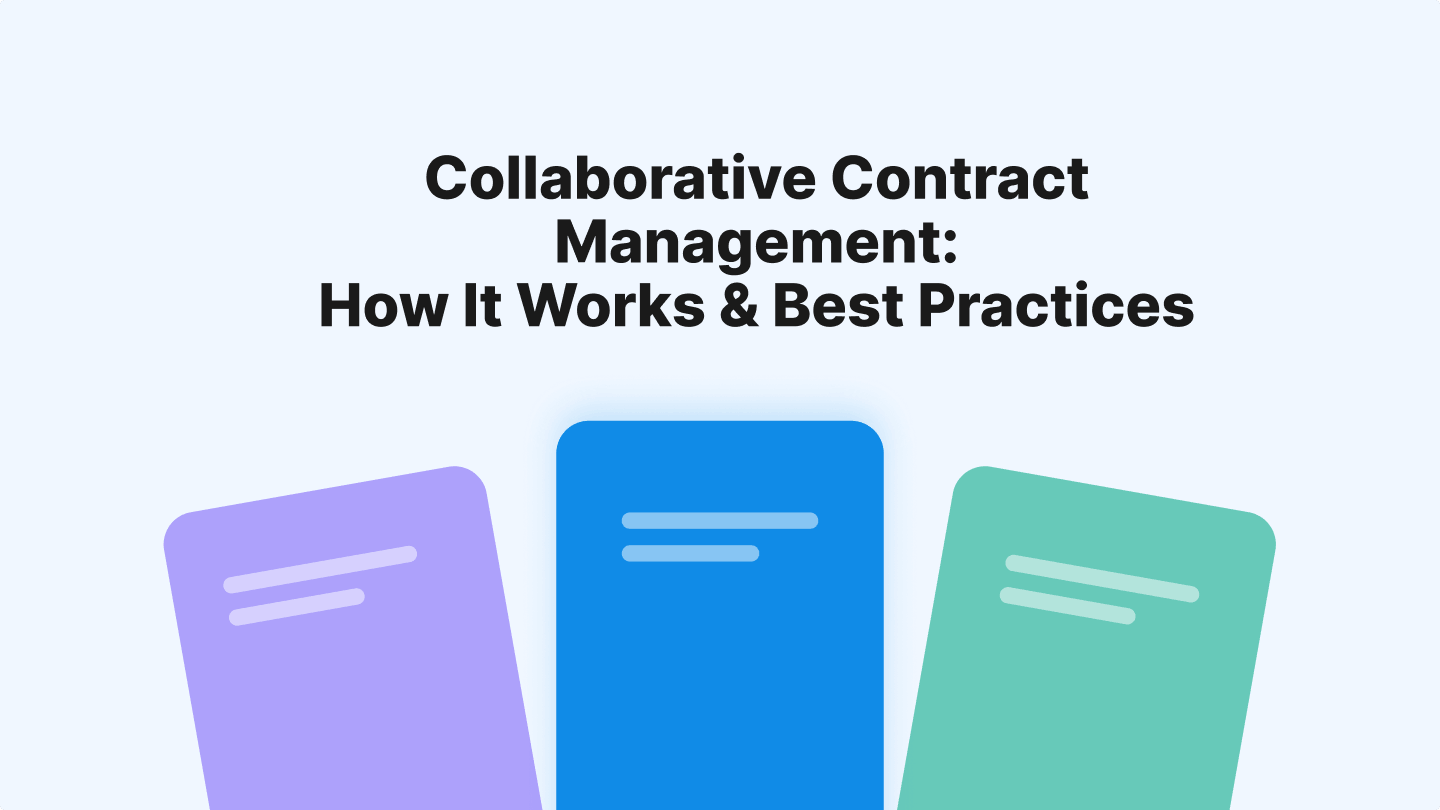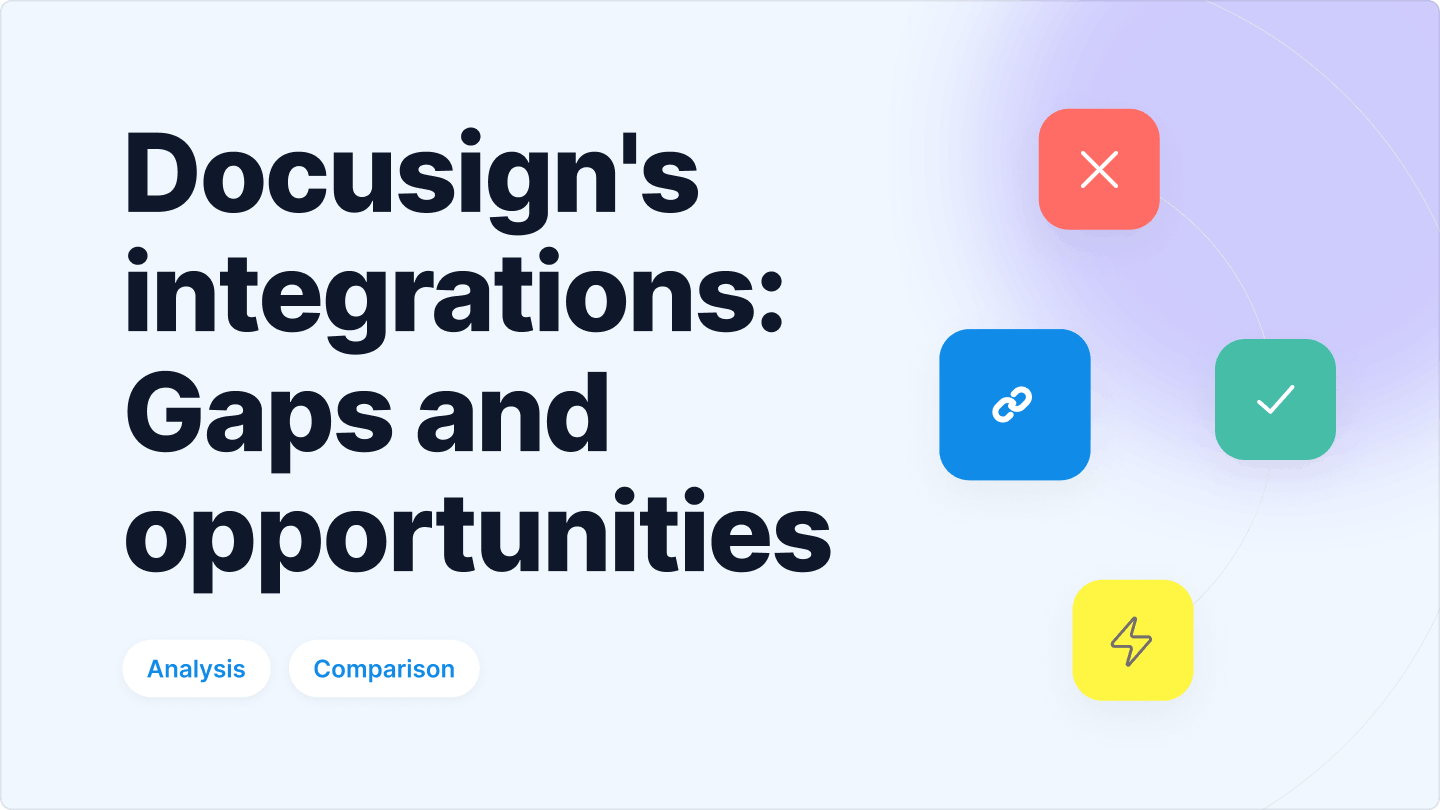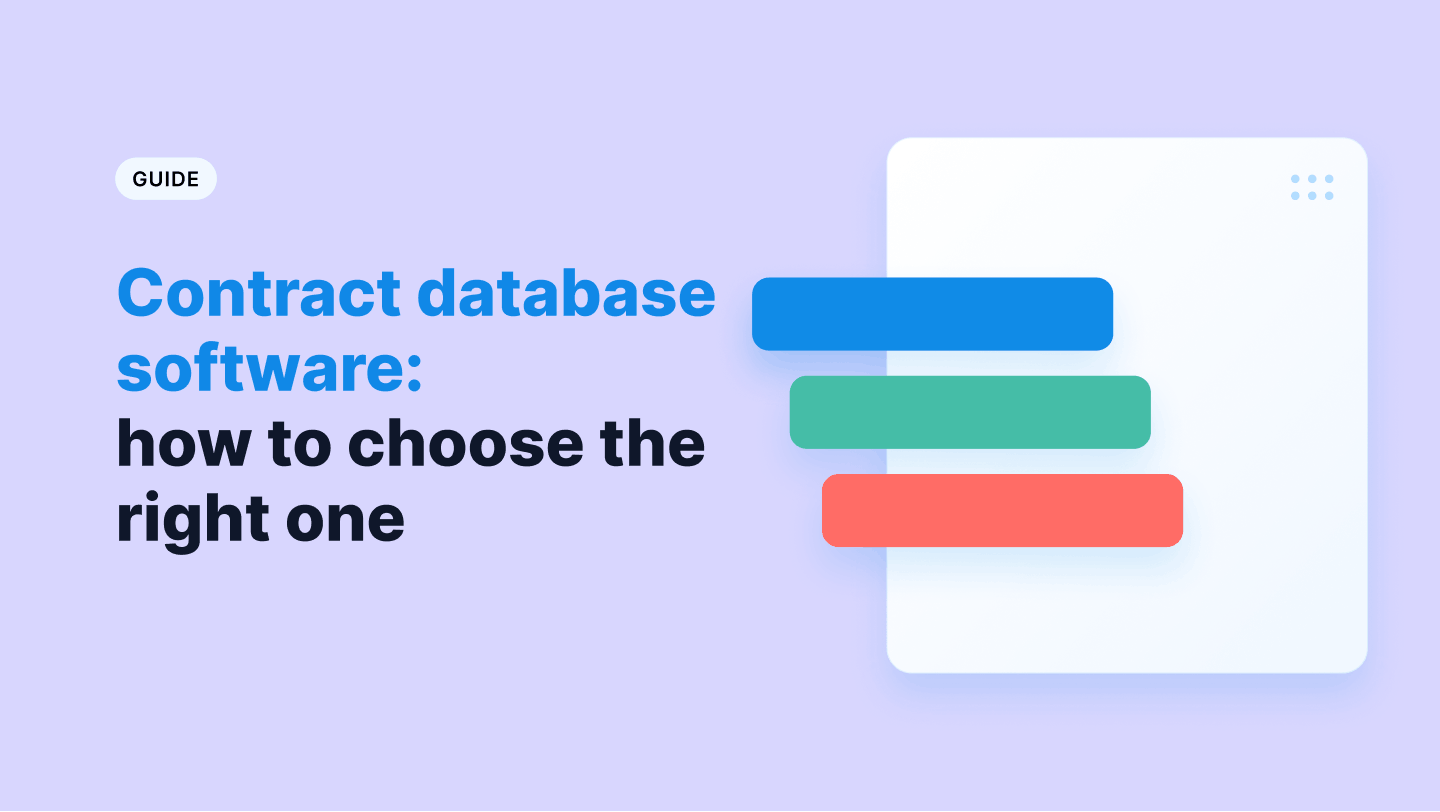Key takeaways
- AI in contract management turns static documents into dynamic, intelligent assets that speed up drafting, reviews, collaboration, and approvals.
- It streamlines workflows by extracting key terms, summarizing contracts, helping teams meet compliance requirements, and enabling real-time collaboration.
- Businesses gain faster contract cycles, improved productivity, reduced risks, and greater scalability, with measurable improvements in efficiency and compliance.
- Signeasy makes contract management easier and efficient with its Ask AI for quick insights and answers about the contract to save time such as extracting important dates and setting reminders.
Believe it or not, AI contract workflow has cut down contracting lifecycle time by a whopping 68%. That’s hours, even days shaved off from draining your resources on routine admin tasks (drafting, reviewing, negotiating).
And here’s the thing, artificial intelligence isn’t a new innovation, it was there all along. However, AI as an end-to-end contract management solution is still a fresh concept that’s growing faster every year. Take Signeasy for example. Our AI assistance can help you review contracts, summarize key points, and answer tricky clause-related questions in seconds.
But, since you’re here reading this post, chances are some questions about AI contracts still bugging you right now
- What exactly is an AI contract?
- Can you really trust it with high-stakes tasks like payments, sales deals, or legal ops?
- Is AI genuinely changing contractual workflows, or is it just a market hype?
Well, we encourage a curious mind, and have answered all the questions you may have about AI contracts in this guide. So, let’s start with the definition first.
What is AI for contract management?
Artificial intelligence for contract management means using advanced AI algorithms and machine learning to streamline the creation, review, distribution, oversight, and management of contracts.
Unlike traditional methods where contracts are managed end-to-end manually, here AI takes the process over.
An AI contract management tool can:
- Extract key terms and critical clauses, such as payment terms or deadlines, with a "Go to Source" link for quick access.
- Generate concise overviews of lengthy contracts to help the readers comprehend them without manual review.
- Detect important dates and integrate them with calendars like Google or Outlook for timely follow-ups.
- Streamline every stage of your contract process by automating workflows with reusable templates, predefined signing orders, and built-in reminders, ensuring faster drafting, reviews, approvals, and signings with minimal manual effort
- Support compliance with regulations such as HIPAA, GDPR, and eIDAS by providing secure infrastructure, encryption, access controls, and audit trails.
The software can also integrate with diverse communication and project management tools like Microsoft Teams, Google Workspace, HubSpot, etc., for centralized management and collaboration.
Suggested read: Two-way contract: How does it work?
How is AI changing contracts?
AI is changing how contracts are managed, bringing big improvements to different parts of the process, such as data extraction, automation, language analysis, and insights.
1. Data extraction
Contract data extraction is manual and time-consuming, prone to errors and inconsistencies. Contract managers spend countless hours reviewing and manually inputting data into databases or spreadsheets.
Using natural language processing (NLP) algorithms, AI can analyze contract documents and extract relevant data points, such as contract dates, payment terms, parties’ names, contract values, and specific clauses.
The automated extraction process is faster and more accurate than manual data entry, reducing the risk of errors and inconsistencies. Contracts are a rich source of information, and AI can extract valuable insights from the extracted data. This enables better decision-making, risk analysis, and contract performance tracking.
2. Automation
Managing numerous contracts requires significant time and effort, leading to delays and potential errors. Automation efficiently handles a large volume of contracts and redundant processes. With AI, contract creation, review, and approval can be automated, reducing the time and resources required for these processes.
AI-powered systems can also automate follow-ups and reminders for contract milestones. This ensures important deadlines are not missed.
Contract storage is another area where automation can be applied. The traditional process involves physical filing systems or scattered digital repositories, which makes it challenging to locate specific agreements. AI-powered automation centralizes storage and provides intelligent search capabilities, enabling users to quickly find and access the contracts they need.
3. Language analysis
Contracts are laden with complex legal language, making it challenging for both legal and non-legal professionals to comprehend the terms and clauses accurately. AI tools now have the capability to analyze contract language and simplify it, ensuring better understanding and clarity.
During the review process, AI tools can identify potential issues, inconsistencies, or missing clauses, enhancing the quality and accuracy of contracts. AI-powered systems can also summarize lengthy contracts, extracting key insights and highlighting essential information.
4. Insights and analytics
Contract analysis requires extensive manual review, making it time-consuming and prone to human errors or oversights. Using ML algorithms, AI can detect potential risks within contracts. It can identify clauses that are non-compliant with regulatory requirements or unfavorable to the organization’s interests. By flagging these risks, AI empowers organizations to mitigate potential liabilities.
AI can analyze a large volume of contracts to identify patterns and trends. This enables organizations to uncover valuable insights regarding contract performance, supplier relationships, or customer behavior. For example, AI can identify common negotiation points or clauses frequently leading to disputes, helping organizations improve their contract drafting and negotiation strategies.
What can AI contract management software do?
AI contract management software, like Signeasy, transforms agreement handling with intelligent automation. It streamlines processes, saves time, boosts accuracy, and enhances productivity.

1. Extract key terms for faster reviews
AI analyzes a contract to pinpoint critical details, like payment terms or deadlines, linking to their source.
Signeasy’s AI scans contracts instantly to deliver insightful overviews of key terms and clauses to understand them better.
This allows you to:
- Avoid overlooking essential contract details
- Streamlining your contract review and approval process
- Reduce errors and support compliance
For example, your teams can use AI to instantly locate deal terms or clauses from a contract for better, faster decision-making.
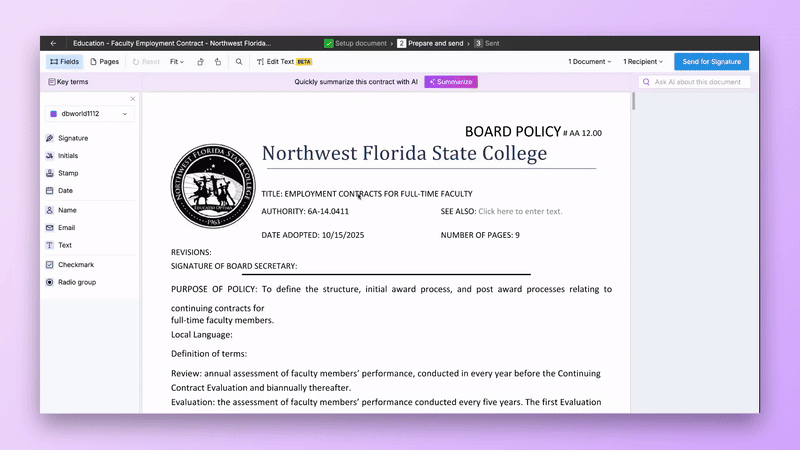
2. Summarize contracts for quick insights
AI can distil lengthy agreements into concise summaries for clear overviews for every stakeholder.
These overviews allow users to understand the contract quickly without needing to go through the entire document. For example, an HR manager can review the obligations in a non-disclosure agreement (NDA) quickly using contract AI without a page-by-page analysis.

Signeasy offers you quick summaries to contracts you sign in a matter for seconds and take you to the right section for more context
Teams can save time and minimize oversight risks, and make faster decisions on whether to close the deals or enter re-negotiations.
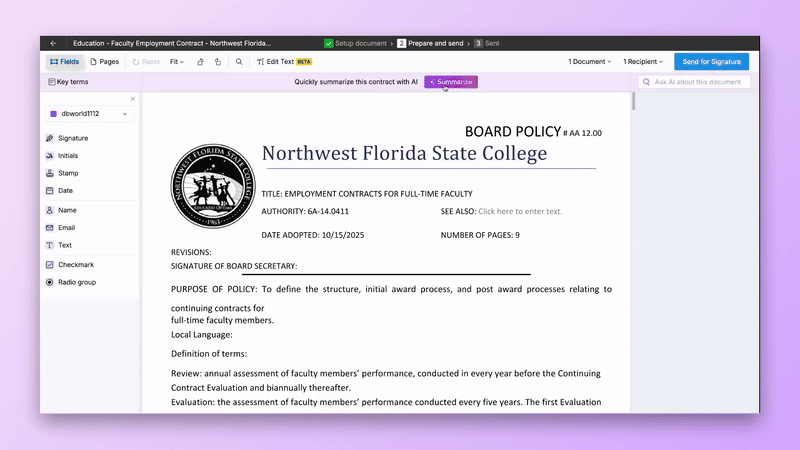
3. Answer queries for instant clarity
Businesses often deal with multiple contracts with similar terms. Hence, it becomes vital to clearly understand the distinctions between contracts.
AI can help immensely here with its chatbot-like capabilities.
You can ask the AI questions like “What’s the penalty clause?” or “What are the payment terms?” and it can offer you clear, quick answers.
For example, finance teams can clarify terms during client calls without delays. Or HR can talk about compensation during salary negotiations with potential talent.

Interact with your contracts with Signeasy’s Smart Q&A feature to understand legal documents faster
As it reduces research time and supports teams with real-time insights, decision-makers and negotiators can reach decisions faster.
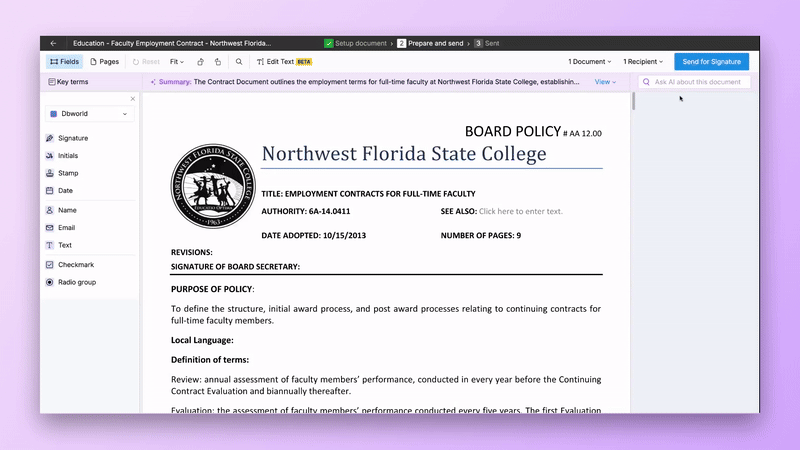
4. Contract renewal reminders
Missing out on your contract renewal dates can be challenging. That’s why our AI assistant keeps track of renewal dates to send you automated reminders.
When the AI detects a renewal date on your contract, it offers you the option to set a reminder.
And with a single click, your reminder is set.
This allows you to save your team from constantly reviewing multiple contracts for renewal dates and missing a renewal, ever.
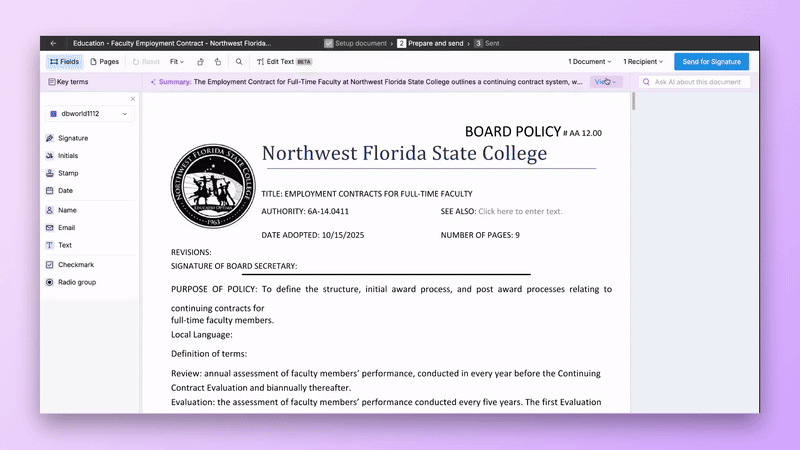
How will AI change contract management?
AI is already changing contracts. Yes, but to understand the gravity of its impact, we need to go back to a time when contract management was all but manual (and boring).
There was no interaction, and creativity was almost always zero. And it was a real struggle for businesses as it drained them of time and resources.
Here’s a quick comparison of manual vs AI contract management:
Manual contract management was cumbersome and incoherent due to several challenges:
- Understanding lengthy contracts for key terms, like payment clauses, took hours or days and delayed deals
- Manual data entry often led to mistakes, like incorrect dates or missed compliance requirements, leading to legal risks
- Sharing drafts via email caused version control chaos, and teams struggled with track changes across departments
- Finding specific contracts or clauses was like searching for a needle in a haystack, as there was no centralized repository
- Tracking regulatory requirements manually often resulted in overlooked obligations and exposed businesses to penalties
With AI, clarity emerges from complexity, contract insights are highlighted the moment a document hits your inbox. And seamless collaboration has become the heart of AI-based contract management.
Teams that draft and review contracts have more insights than ever before to make contracts better and in alignment with their business goals.
And this all leads to:
- Quick contract reviews leading to faster approvals and contract signing
- Real-time editing and shared templates streamline teamwork
- Proactive compliance with automatic alerts and reminders
- Mobile-optimized contracts with biometric security
- Quicker reflections of changes and updates in contracts
- Contracts becoming interactive and tagged with metadata
- AI-powered repositories enable instant searches for contracts or clauses
And this is reflected in the sentiment shared by Mike Haven, the Head of Global Legal Ops at Intel (now Meta) on one of our webinars about how AI is changing how we use data:
"AI can just go to work with the data... Over time, AI will be able to structure the data for us.”
However, despite these benefits, only 21% of businesses have integrated AI into their processes, says the World Commerce and Contracting in its 2023-survey titled ‘AI in contracting: an untapped revolution’.
How using AI for Contract Management drives business value
In contract management, manual intervention is the biggest reason for inefficiency. As humans, we shouldn’t be saying this. But this is the reality.
That’s why AI contract management enables businesses to enjoy measurable results and improve efficiency by replacing manual tasks with automation.
Here are 7 ways how artificial intelligence in contract management can drive real business value for its users:
- AI contract management software can speed up contract cycles. With automated drafting, reviews, workflows, and approvals, these tools eliminate bottlenecks and help teams close deals faster.
- There may be missing terms, risky clauses, compliance gaps, and critical inconsistencies in their contracts that humans may miss. AI can identify and flag these issues to help businesses avoid losses in the future.
- Businesses need to comply with several regulatory requirements, like HIPAA, SOC 2, and eIDAS. With built-in monitoring, these AI-enabled contract management systems can ensure you never miss these compliance and alert you if you fall short of any obligation.
- As a business, you must work with diverse teams, like sales, finance, HR, and legal, when working on contracts. Using an AI contract management platform allows you to ensure seamless collaboration with real-time updates and revisions.
- When you grow as a business, the number of contracts also tends to grow, and with it, the complexity of managing them grows, too. AI-enabled contract management tools can quickly scale as you grow with in-built capabilities to handle the load without added headcount or complexity.
With these benefits, AI-driven contract management shifts from being a back-office tool to a business growth engine that supports consistent growth.
Benefits of using AI in contract management
Imagine having a personal assistant that never tires, is always at your disposal, and can instantly analyze vast amounts of data—that’s AI. With its ability to simplify complex information, AI has become a valuable asset in automating contract management.
Top benefits include
1. Increased efficiency and productivity through automation
AI simplifies and standardizes contract management, giving organizations more flexibility and adaptability. By automating processes like data extraction and contract requests, AI speeds up procurement and shortens contract lifecycles, boosting productivity. It also helps identify risky clauses and alerts the team for review, improving process efficiency.
2. Reduction of manual errors and improved accuracy
Contracts contain important details such as dates, deadlines, terms, payment terms, termination clauses, and more. And going wrong with this information can lead to ambiguous clauses and non-compliance with legal requirements. AI in contract management can help minimize these errors by automating review processes, ensuring standardized language, extracting data intelligently, and checking for compliance, improving the accuracy and quality of contracts.
3. Enhanced risk management and compliance
AI enhances risk management and compliance by identifying and analyzing contract compliance terms. It enables proactive monitoring of changes in terms and conditions, helping organizations manage risks better. AI software also ensures the security of sensitive data. With AI, organizations can streamline compliance processes and achieve greater confidence in risk management.
4. Time and cost savings in contract management
Mistakes in contracts can have significant financial consequences for legal organizations. For instance, a poorly worded contract can lead to misunderstandings or disputes, resulting in costly litigation expenses. Non-compliance with regulatory requirements can lead to penalties or fines, impacting the company’s profitability. With AI, these risks can be mitigated. AI automation also saves time in tasks like data extraction, analysis, and drafting, further enhancing efficiency and minimizing the potential for mistakes.

Disadvantages of AI in contract management
While AI has made remarkable advancements, it still faces limitations in areas such as contextual comprehension, ethical decision-making, and handling unpredictability. There is a continued need for human involvement and oversight. Let’s look at the top disadvantages of AI in contract management.
1. Absence of specific regulations to govern AI tools
There needs to be more specific regulations to govern the use of AI tools in contract management. Without clear regulations in place, it becomes difficult to ensure consistency, fairness, and transparency in the use of AI tools, impacting the overall integrity of contracts. The absence of regulations also raises questions about accountability, as there are no established guidelines to monitor and govern the behavior and outcomes of AI tools used in contract management.
2. Requirement for highly skilled professionals
AI tools require the involvement of highly skilled professionals who are responsible for not only understanding the capabilities and limitations of AI tools but also ensuring their successful integration into existing processes. Smaller firms or organizations with limited resources may face challenges in accessing the necessary technical skills, making the adoption of AI tools less feasible or practical for them.
3. Challenges with bias and misinformation in AI systems
The training data used to teach AI algorithms can be biased, leading to biased outcomes. Misinterpretation of contract text and complex legal terms can also result in incorrect analysis. Algorithmic bias and inaccuracies in data extraction can further contribute to misinformation. Additionally, AI systems may struggle with understanding industry-specific context. To address these risks, human oversight is crucial to review and validate AI outputs, ensuring accuracy and fairness.
4. Ethical considerations in AI-based contract management
As AI assumes greater decision-making responsibilities, particularly in contract drafting and analysis, ethical concerns gain prominence. Recent technological advancements have raised apprehensions about the potential for AI systems to cause more harm than good to society. Ethical considerations include determining the authorship of AI-generated contracts and addressing the ongoing threat of cyber-attacks. Another ethical consideration is the concern of job displacement as AI technologies automate certain tasks. It is crucial to find a balance between leveraging AI for efficiency and productivity gains while ensuring that it complements human capabilities and creates new opportunities.
Tips for deploying your AI contract management solution
Successful implementation of an AI contract management system is a strategic priority for most businesses. It should be for you, too.
And yes, there are actionable tips to help you improve the implementation. It has worked well for our clients, and it should work well for you, too.
Here are 5 actionable tips you can use in 2026.
1. Assess what your business needs from the tool
When searching for an AI-enabled contract management tool, you need to start by looking at your own contract management processes.
It helps you understand what’s really going on with your current processes. Once you get the idea:
- Prioritize your goals and expectations from using the solution
- Figure out the challenges that you want to solve with the tool
- Identify the challenges your finance, HR, legal, or sales teams face
- Understand what makes your current process inefficient or time-consuming
For example, if you want to save time on contract drafting on Google Sheets, look for a tool with robust, generative AI features. Or if you are concerned with data security, find a tool with strong data security.
As you map features to specific goals, you can find a solution that aligns with your priorities and delivers measurable results.
2. Choose a scalable platform
When you grow, you cannot afford to hop from one platform to another. Select a solution that can grow with your business.
That’s a no-brainer.
As your business grows and expands its operational scope, the platform needs to grow with you. Or you may face system failures that can lead to lost deals and contract data.
Hence, when implementing an AI-based contract management tool, look for elements such as:
- Compatibility with CRM and cloud tools
- Support for global, multi-user teams
- Mobile access for on-the-go contract management
A scalable platform ensures AI-based contract management adapts to future needs and avoids disruptions as your organization expands.

For example, Signeasy integrates with HubSpot and Google Workspace, handling increased contract volumes seamlessly.
3. Train teams effectively
The AI tool is only half the picture for efficient contract management in your business. The other half is your team that will use the platform. So you need to train them well.
Custom training helps teams get comfortable with AI and start using it more effectively in their day-to-day work.
For this, you need to:
- Create role-based tutorials to show sales, legal, HR, and finance tasks separately
- Simulate real scenarios to practice version control, clause search, contract drafting, and compliance checks
- Implement tailored learning modules that are accessible on mobile devices on the go
You can also drive productivity and minimize resistance to adoption across the organization with effective training sessions, as well.
4. Start with pilot projects
Avoid rolling out the tool blindly, start with pilot projects to test what works.
Select a team or a department and limit the scope of the test. This sandbox lets you test AI on small workflows, like HR offer letters, before full deployment.
You will also have the opportunity to monitor turnaround times and user feedback to refine processes when testing.
Pilot projects can also help you understand areas where issues arise. And you can address these issues before implementing the tool business-wide to avoid operational issues or workflow disruptions.
With this gradual approach, you can ensure smooth scaling and reduce risks while fostering trust in AI-driven contract management.
5. Monitor and optimize performance
The key to ensuring optimal performance of AI in contract management is to monitor its performance to optimize it for better results.
There are several ways to do it:
- Collect team feedback to identify issues and challenges
- Track user adoption by measuring logins, feature usage, etc.
- Compare contract processing times vs pre-implementation metrics
This will offer you deep insights into areas where the implementation needs improvement. Continuous monitoring drives long-term value and makes AI contract management a cornerstone of efficient operations.
Legal operations role in the AI contract management
Unlike practicing attorneys, legal operations (legal ops) teams play distinct roles in contract management. Attorneys majorly work on the substantive aspects of contracts, the legal ops team makes sure contracts are processed quickly, accurately, and in line with organizational policies.
Their goal is to maintain efficiency. However, as organizations grow, so does the volume and complexity of contracts. Legal ops teams may struggle to keep up without a single contract dashboard, automated workflow process, and the right AI contract management software to scale their processes.
Now, AI technologies like machine learning and NLP are changing how legal teams are used to address those contract management challenges.
For example, a recent study by LawGeex, a legal tech startup, revealed that AI can review contracts faster than you can grab your morning coffee! AI outperformed lawyers in reviewing risks in NDAs. While the top-performing lawyer achieved 94% accuracy, matching the AI, the average lawyer scored just 85%. The best part is that it took the AI tool just 26 seconds to review five NDAs, while experienced lawyers averaged 92 minutes per review.
For legal ops teams, this speed and accuracy mean more than just time saved. AI’s ability to predict risks, ensure compliance, and automate repetitive tasks transforms contract management from a reactive process into a proactive strategy. Machine learning tools can identify high-risk clauses, highlight non-standard terms, and even flag potential regulatory pitfalls before they arise.
To get more answers on legal ops teams' roles in AI contract management, we had a chat with Lucy Bassli, founder of InnoLaw Group and a leader in the CLM space; she shared that there’s a mix of excitement and caution in the legal world. Legal ops teams see AI as a new tool to modernize processes and tackle time-consuming tasks like clause reviews, contract tracking, and renewal management. But attorneys? They’re a bit more careful. It’s not fear; it’s just their natural instinct to understand every potential risk before fully embracing something new.
“(For Lawyers) I don't wanna say it's fear. I think that's over-exaggerating. But I think it's caution. Lawyers like to know exactly what they're getting into. They wanna understand all the what could happen?”-Lucy Bassli
She reminded us of how lawyers were cautious about email back in the day. It took years before email became a standard part of their workflows. But fast forward to today, Lawyers are becoming more comfortable with the technology, recognizing its role in enhancing efficiency without sacrificing accuracy.
And, the benefits of AI are hard to ignore. AI doesn’t just make contract management faster; it makes it smarter. Machine learning algorithms can analyze historical data to spot risks before they happen, predict bottlenecks, and even ensure compliance with complex regulations. Plus, AI tools can process thousands of contracts in seconds. Something no human team could ever manage.
So, AI is here to help legal teams, not replace them. And for legal ops professionals, it’s an opportunity to automate their processes and make an even bigger impact. As Lucy put it, the legal world might be cautious, but it’s also ready to evolve. And AI is leading the way.
Can AI Write Legal Contracts?
The short answer is Yes, AI can draft legal contracts. AI tools, especially large language models (LLMs), are transforming how contracts are created. These tools use deep learning algorithms to understand, predict, and generate human-like text based on massive datasets, including legal documents.
AI can draft contracts quickly, ensuring they cover essential elements like clauses, obligations, and compliance. It's like having a super-speedy assistant to handle the heavy lifting of contract drafting.
However, AI still has its limits. While it’s excellent at generating a starting point, these drafts require careful human review. Legal documents often involve nuances, specific wording, or jurisdictional requirements that AI might miss.
As Patrick Lavan, marketing manager at Bloomberg Law, aptly puts it, “LLMs can give you a starting point for a legal document, but a lawyer needs to take it across the finish line.”
For legal teams, AI isn’t replacing expertise—it’s amplifying it. Lawyers can spend less time on repetitive drafting tasks and more time strategizing, negotiating, and addressing client needs. While we’re not at the stage where AI can independently create flawless contracts, the technology is advancing rapidly to pave the way for a more efficient future in legal work.
Key features of AI contract management software
An AI-powered contract management tool streamlines workflows, saves time, reduces risk, and gives teams clear visibility across the entire contract lifecycle.
Below are the top features you should look for when looking to buy an AI contract management solution.
1. Automated contract drafting
AI tools can generate contracts using pre-approved templates and clause libraries. Often, these tools are trained on thousands of diverse legal documents and contracts.
As the frosting process is overseen and led by well-trained gen AI models, you can:
- Save the time spent on manual drafting
- Ensures consistency across agreements
- Ensure faster turnaround times
- Reduce drafting and compilation errors
- Create contracts that comply with company policies
With Signeasy, you can automate contract drafting with ease. It offers standardized templates to reduce errors and predefined roles for efficiency.
2. Intelligent cause and risk analysis
As a busy business leader, would you have your team read lengthy contracts? Or invest in an AI contract management tool that offers intelligent cause and risk analysis?
The latter, obviously.
Enabled by natural language processing, AI reviews lengthy contracts and highlights risky clauses, missing terms, or non-standard language.
This helps your team understand what they need to focus on and address.
Businesses can also cut down review time and minimize exposure to hidden legal and financial risks with this feature.
3. Smart search and retrieval
AI-powered search allows teams to locate specific clauses, dates, terms, or obligations in seconds using keywords or filters.
You can save hours with the seemingly simple feature and help teams respond faster during audits, sales calls, negotiations, or compliance checks.
Hence, for businesses that work in highly competitive sectors, smart search and retrieval is crucial.
4. Automated workflow and approvals
As you manage tens of thousands of contracts in your organization, routing these contracts to the right stakeholders for review and approval is never easy. And you also need to send them to businesses, track their progress, and nudge the contractors to sign it, and more.
That’s why automated workflows to distribute and track the contracts are vital. They remove bottlenecks often caused by manual email chains and follow-ups
At Signeasy, we make it easier using automated workflows for:
- Sequential signing to auto-route documents to the next signer
- Auto-reminders to keep signers and contracts on schedule
- Real-time notifications to track signing
These workflows ensure faster approval cycles and clearer accountability for improved collaboration between diverse teams.
For instance, Eversendai used Signeasy’s automated workflow features and integration with SharePoint to complete 69% of all their contracts in the first two days.
5. Seamless integration with business tools
No businesses ever operate in an isolated environment, as you need to use data from different CRM, ERP, and collaboration platforms.
Since contract management involves several departments, stakeholders, etc., integration is a core feature for an AI contract management tool.
For example, your contract data needs to flow smoothly between diverse systems to avoid duplicate entries, distribute the contracts to the right stakeholders, track signing progress, and ensure visibility to adequate teams.
Failing to ensure integration makes it hard to track contract drafting and revisions.
That’s why Signeasy comes with strong integrations with popular tools like Microsoft Teams, HubSpot, Google Workspace, and more.
Case Studies: How AI is changing Contract Management
Signeasy has helped diverse businesses from numerous industries to improve their team’s productivity by streamlining its contract management efforts.
Check out the following case study to understand how Signeasy can help you, too.
How Property Masters improved signature collection with Signeasy
- Name: Property Masters
- Industry: Real-estate
Here is what Nicole Ledford, the Director, Vendor Management, at Vendor Masters has to say about Signeasy’s AI features.
“Signeasy’s AI tool helped us summarize lengthy documents in seconds and recommended things to us that we didn’t know. It made our review process much more efficient.”
Challenges
Property Masters operated multiple companies under its umbrella. Each of these companies had distinct eSignature requirements.
This led to diverse challenges:
- The signature collection was disorganized across multiple entities.
- Getting signs was chaotic with emails, PDFs, GIFs or screenshots.
- Some documents were never returned, causing significant delays.
Vendor management was paperwork-heavy, which led to time-consuming and inconsistent document returns.
How Signeasy helped
Signeasy provided a centralized eSignature platform that unified all Property Masters companies under one system. It ensured faster turnaround times and improved response and completion rates. It also proved user-friendly for candidates, new hires, and vendors, while meeting the IT’s strict security goals.
Key features included:
- API integration with their web application
- Multiple signers for collaborative documents
- Color-coded organization to track dates and signatures
- Multi-factor authentication for added security
- Bulk and batch sending for efficiency
Property Masters recommends Signeasy for its:
- Efficient, easy to implement, and user-friendly for daily, large-scale document processing.
- Frictionless process to collect high volumes of signatures
- Ongoing value, backed by responsive and professional customer support
Ready to embrace AI contract with Signeasy?
Where contract volumes are sky-high, and the stakes are even higher, AI can be your greatest alley. With AI features like summaries, smart Q&A, to key terms extraction, AI can change the way you approach contract management.
At Signeasy, we’ve always been dedicated to making contract management effortless. With Signeasy AI, we’re taking that promise further by introducing smart, intuitive solutions for contract review. Signeasy AI is built with privacy, security, and transparency in mind. Your data stays yours, protected by state-of-the-art encryption, secure proxy layers, and compliance with global standards.
So, give Signeasy AI a try for free, too, and experience how effortless and reliable contract management can be.











